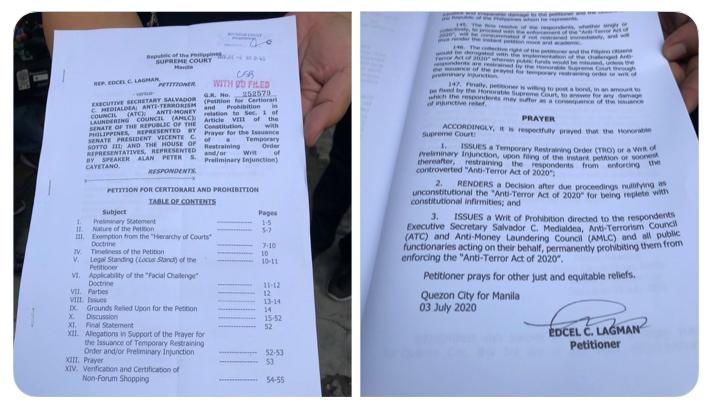Lagman contests anti-terror law at Supreme Court

Albay Representative Edcel Lagman on Monday challenged the constitutionality of the Anti-Terrorism Act of 2020 before the Supreme Court (SC).
Lagman, who claims to be the first lawmaker to have filed a petition against the controversial new law, also asked the SC to issue a temporary restraining order or a writ of preliminary injunction that would stop the enforcement of the law pending the court's decision.
The legislator's petition is at least the second challenge against the anti-terrorism law, following that of former Education secretary Armin Luistro and a group of lawyers including Howard Calleja.
Other groups are expected to file their own petitions against the law. Retired SC justice Antonio Carpio previously said he will join a petition.
Lagman said the crime of terrorism was defined in "vague and ambitious language " in the new law, "so much so that there is no certitude on what acts are proscribed and the people are perplexed on what acts to avoid."
"The indispensable element of political or ideological motive has been deleted which compounds the incompleteness and imprecision of the new law even as it facilities the arrest, prosecution, and conviction of suspects," Lagman said in a statement.
He also argued that the criminalization of "threat," "proposal," and "inciting" to commit terrorism has "chilling effects" on the right to free speech and dissent.
Like other critics of the law have raised, Lagman questioned the warrantless detention of up to 24 days of terrorism suspects before they have to be brought before a judge. Lagman said this is an "unreasonable seizure of a person in violation of the Bill of Rights."
The opposition lawmaker also claimed that the up-to-90-day technical surveillance and wiretapping of communications under the law is an "unreasonable invasion of a person's privacy which is guaranteed by the Constitution."
"An inordinately long maximum of six-months investigation of a suspect’s bank accounts and the freezing of his assets, both without judicial authorization, and the open-ended freezing of property or funds in certain circumstances, constitute unreasonable seizure of one’s assets," he added.
He also said that the designation of a person or an association as a terrorist "without judicial intervention or authorization" infringes on the freedom of association and due process.
Lagman further argued that the supposed grant of judicial powers to the Anti-Terrorism Council and the Anti-Money Laundering Council violates the doctrine of separation of powers.
The lawmaker said the new law does not contain several safeguards that were in the Human Security Act of 2007, the old law that the anti-terrorism law replaced.
"The so-called safeguards in the 'Ant-Terrorism Act of 2020' are mere motherhood declarations which are eroded by oppressive provisions and a killer proviso that negates any concession to advocacy and dissent," he said in the statement.
He pointed out that the exemption of advocacy and dissent from the definition of terrorism is "decimated" by the caveat that the exemption covers such acts if they are "not intended to cause death or serious physical harm to a person, to endanger a person’s life, or to create a serious risk to public safety."
"All that a devious and underhanded law enforcer or prosecutor has to do is to conveniently invoke the killer proviso to stifle political dissent and peaceable assembly for redress of grievances," he said.
The lawmaker also said that the implementing rules and regulations (IRR) of the law cannot correct its "deficiencies and excesses" because the IRR "cannot modify, amend or repeal a statute."—AOL, GMA News



